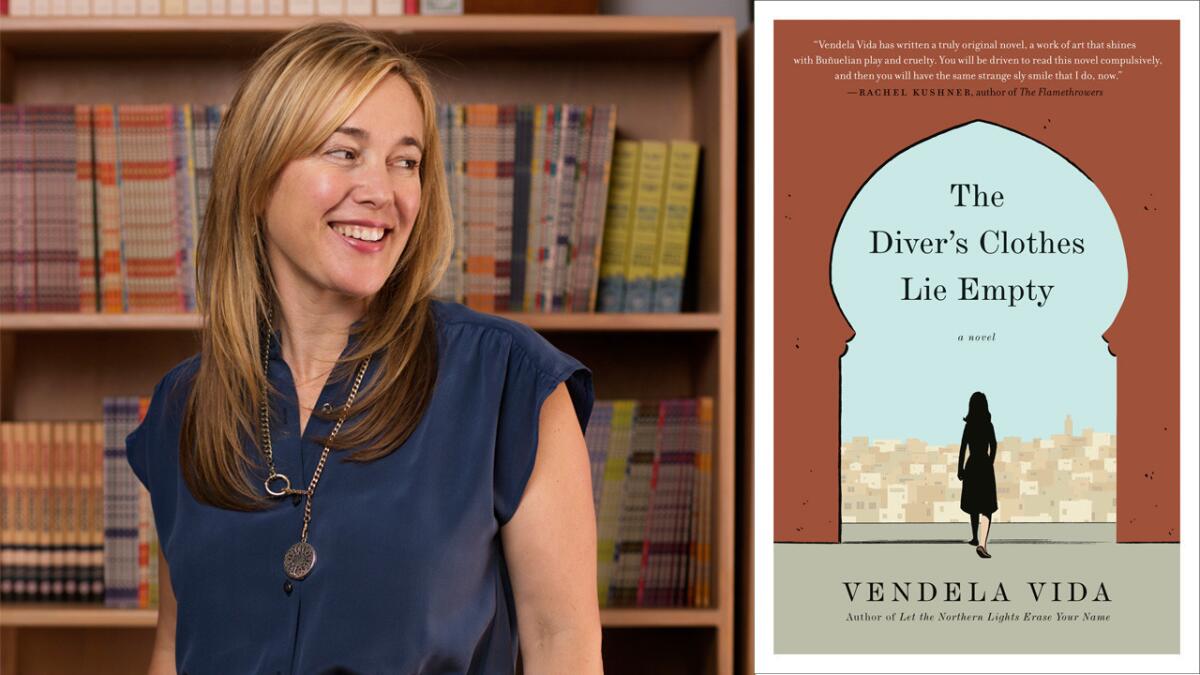Review: Vendela Vida takes readers inside her new novel, ‘The Diver’s Clothes’

‘The Diver’s Clothes Lie Empty’ and author Vendela Vida.
Vendela Vida has for more than a decade published novels centered on women in crisis. Set in foreign lands, her stories push the boundaries of preconstructed female identities.
Vida’s fourth — and most accomplished — novel, “The Diver’s Clothes Lie Empty” (Ecco: 216 pp., $25.99), is a page-turning thriller with a subtle, satirical bent; it follows an unnamed narrator through the streets of Casablanca as she tries to escape a failed relationship and restart her life.
In the opening pages, her backpack, containing passport, money and computer, is stolen from the hotel where she is staying. Vida’s heroine ends up taking on several identities not her own and begins to mold her personality from them; in part, to keep from being caught but more practically to survive.
Summer reading guide: The 136 books you’ll want to read
By happenstance, she is offered a job on a movie set as a stand-in for a famous actress, and this device sets the book’s break-neck cinematic pace. I talked with Vida about the novel and her inspirations, including travel, film and getting school credit for lying.
Your title, “The Diver’s Clothes Lie Empty,” comes from a Rumi poem, which you reproduce in its entirety midway through the book. Did you know that was going to be the title all along?
It was something I came to later. Martin Amis once said there are two kinds of titles: The title you have in the very beginning or the one you have at the end, and if you figure out the title in the beginning, it creeps into the narrative as you’re writing it. For me, it’s the opposite; I like to stumble upon the title after I’ve written a lengthy draft and shared it with others. In the case of “Diver’s Clothes,” I was showing parts of the book to a writing group I’ve been a part of for the last 10 years, and one of the writers said, “Isn’t there that great Rumi poem about a diver?” Afterward, I went to Dog-Eared Books in San Francisco and found a book of Rumi poems, and as soon as I found the poem and read it I knew it was going to work as the title of my book.
You’ve said that you read a lot of other authors’ books when preparing to write your own. What other media do you rely on for inspiration?
I do read a lot of novels when I’m gearing up to write a novel. But when I’m writing the book itself, I tend to read a lot of poetry. I love the attention to detail poets have. I find that helpful. When I was writing this new book, I didn’t actually let myself read many other books; instead I turned to film. I had a professor when I was in grad school say that if you ever get stuck writing a book, try to imagine it in a different medium. So for the opening of a book, what would it look like if it were a film? Or a play? Anyhow, I watch a lot of movies that are related to the book when I’m writing it.
What are some examples in relation to “The Diver’s Clothes”?
The Michelangelo Antonioni film “The Passenger” is one. It’s not set in Morocco, but there’s this idea of using someone else’s passport and taking on someone else’s identity — that was fascinating to me. I also watched “The Talented Mr. Ripley.” Any films about identity that also had a thriller component were really useful.
The American actress in the book is portrayed satirically, but she is never named. Are there details that, in your view, are better left unsaid?
Years ago, I was interviewing Shirley Hazzard for the Believer [magazine], and in her book, “The Great Fire,” she has a character on a train reading a book, and she never says what the book is, but she gives snippets or hints. The book is “War and Peace,” which she confirmed with me when I interviewed her. But I really admired the way she did that: She didn’t tell the reader what the book was, but it helped you get inside the character’s mind. I loved that technique, and I’ve used it a couple of times now.
This slight skewering of Hollywood: Was it something you originally intended, or did it surface in the writing?
I think it was always present. My other books have come off a little bit dark at times. With this new book, I wanted to make sure I kept it light enough so that I could inject humor when needed. I didn’t set out to write a satire, per se, but I wanted to have the capacity, this time around, to use humor. I really enjoy writing and reading humorous scenes.
When did you know you wanted to be a writer?
I knew I wanted to be a writer at a young age. My parents weren’t big readers, but they did have a great collection of books, in part because my father had an antiques business and gallery. He had this big, beautiful old bookshelf, and he had to fill it with books, which I think he got at a garage or estate sale. So my sister and I would take these books down and read them, even though we probably were too young. I remember loving Somerset Maugham’s books, even though, looking back now, it’s unclear how much I truly understood at the time.
Also, I would get into trouble for lying when I was younger. I was always lying. I remember once telling a bunch of neighbors that my family had adopted my friend, who was visiting, and that she was going to live with us. News made it around the neighborhood, and the consequences were terrible. I remember being grounded in my room, having to call everyone and apologize for making this story up.
Later, when I was 10 or 11, I wrote a short story in school and it dawned on me that this might be a way to lie and get away with it. And what’s better, I was getting credit in school for coming up with these tall tales.
Gabel is a writer, editor and small publisher in Los Angeles.
::
Vendela Vida in L.A.
What: The author reads from “The Diver’s Clothes Lie Empty”
Where: Skylight Books, 1818 N. Vermont Ave., L.A.
When: 7:30 p.m. Monday
Admission: Free
Info: (323) 660-1175
More to Read
Sign up for our Book Club newsletter
Get the latest news, events and more from the Los Angeles Times Book Club, and help us get L.A. reading and talking.
You may occasionally receive promotional content from the Los Angeles Times.








